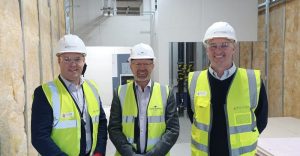Investing in a ‘future proof’ economy is important for all industries, not just construction. Ensuring the UK has the technology and knowledge required to compete in a global market is a key strategy for the current government. Over the last few years many industries have ‘held their breath’ as our government’s focus and our news headlines have been hijacked by Brexit, and now our economy has been shaken to the core by COVID-19, subjecting businesses to further pressure and uncertainty. In the third blog of our COVID-19 series, we explore how, in these precarious times, losing sight of our future in order to deal with the present may have lasting implications for our economy.
The Industrial Strategy
Teresa May’s 2017 Industrial Strategy vowed to create the right conditions to help emerging ‘high-tech’ businesses flourish and grow. Developing innovative technologies which range from artificial intelligence and big data, to clean energy, self-driving vehicles and robotics, these businesses are incredibly important to the future of our economy. The Industrial strategy committed to identifying industries which are of “strategic value to our economy” and to creating a partnership between government and industry to ensure they were well nurtured.
Technology-enabled innovation has the power to help us ‘work smarter’ and transform traditional processes to improve productivity and efficiency. This is incredibly important for an industry such as construction which has long been criticised for not harnessing the power of innovation and embracing digital technologies.
Mark Farmer warned us in his 2016 ‘Modernise of Die’ report commissioned by the UK government, of the need to create a modernised and sustainable construction industry which has the skills necessary to improve productivity, and in recent years most organisations are deciding ‘when’ rather than ‘if’ they will digitalise their workplace to reap the benefits. We are standing on the cusp of huge technological change which has the power to benefit the construction industry and its customers by improving project outcomes.
The need to continually modernise and evolve in order to survive as markets change, is true of any industry. Almost all industries will be impacted by the Net Zero Carbon target of 2050 and many are now shifting their focus to find the technologies needed to address the climate change emergency and to meet our challenging carbon reduction targets. Will these priorities suddenly be on hold whilst we grapple with the pressing issues of a failing economy? Of course, a thriving economy is also at the heart of any successful industry, but by diverting government funding and support away from developing these new technologies in order to save collapsing legacy industries, do we run the risk of taking a huge step backwards?
A Careful Balancing Act
The Office for National Statistics reported that the economy slumped by 20.4% in the lockdown month of April – the biggest drop since such figures were kept. The Government currently faces a difficult choice; bail out businesses who have traditionally been the backbone of the economy, but which commonly operate carbon-intensive activities, or let them fail and risk further harm to our economy.
Last month, details emerged of ‘Project Birch’ a Treasury plan designed to provide state support for the companies hit by COVID-19 whose demise would “disproportionately harm the economy”. ‘Project Birch’ could see the government take equity in some of the biggest names in British business, such as Jaguar Land Rover, Virgin Atlantic, Rolls-Royce and Tata Steel.
The car industry is a good example of a legacy industry which has traditionally held up our economy and is currently in crisis. It has had to negotiate many challenges over recent years; first the diesel crisis, then Brexit and now the COVID-19 shutdown. The industry must also be ready for the dramatic changes required as a result of green targets, requiring significant investment to develop the sustainable technology to move forward in the market.
If the government is willing to take a strategic role in industries such as this, there may be more opportunities to push through change at a faster rate and to influence their sustainable future. Either government helps to finance business such as JLR and Rolls Royce and use its leverage to impose environmentally-friendly reforms, or it ends up paying people to be unemployed.
This is Not a Time to Move Backwards
If we have learnt anything during lockdown, it is that returning to our pre-lockdown state is no longer an option. The desire for change is palpable and the public are demanding reform, as captured by local councils ‘Build Back Better’ campaign. We need to use this time of change to rectify some of the issues that we had become resigned to pre-covid.
Having sampled an alternative lifestyle during lockdown, communities now want to reclaim the streets and make our city centres bike and pedestrian friendly; we want good quality, sustainable housing which is affordable for families; we want sustainable public transport options and above all, a fairer, more equal society. We can’t achieve these improvements if we slip backwards and stop supporting and investing in future technologies and the businesses who are geared up to make it happen.
In recent years, the construction industry has been forced to take a long, hard look in the mirror and begin to address some of the perceived barriers to change. As an industry we are now more willing to embrace technology and are determined to improve the image of construction and make it a more attractive workplace for a new, digital savvy generation.
Yes, we face challenges recovering post-covid, but as an industry we are resilient; it goes with the territory that we are able to adapt and work flexibly, it is what we do every day in the management of our projects. We are also optimistic; The Chartered Institute of Building (CIOB) has released survey results which show that 92% of construction professionals around the world expect their businesses to survive the COVID-19 pandemic.
Even during a time of crisis such as this, it is important to keep pushing the boundaries and fighting for the investment needed to develop the technologies which will improve project outcomes for our customers. We must allow these current challenges to refocus our attention on where our future as an industry really lies.

Robbie Blackhurst is the Founder and Director of Black Capital Group, the holding company that powers Advance Social Value, Compliance Chain, Procure Partnerships Framework and Strategic Resourcing. Robbie is a member of the Chartered Institute of Builders, is MCIPS certified and has an undergraduate degree in Aviation and Aerospace, a postgraduate degree in Construction Project Management, and a Master’s in Business (MBA).



